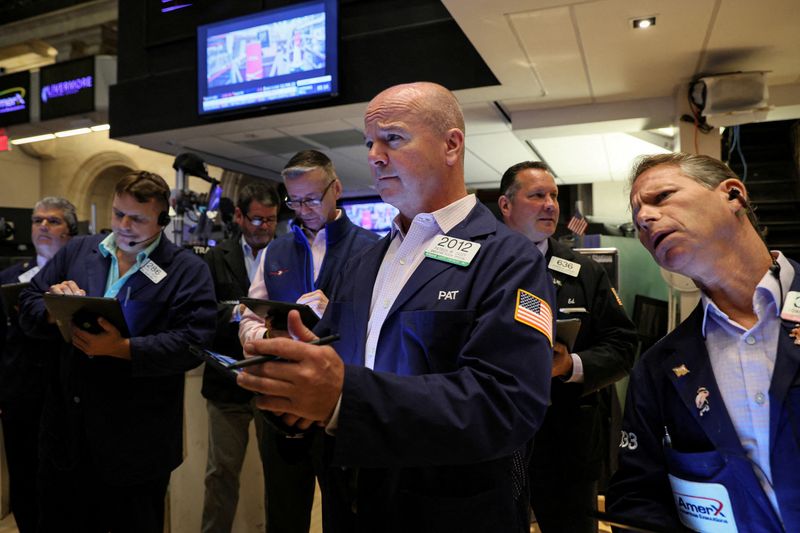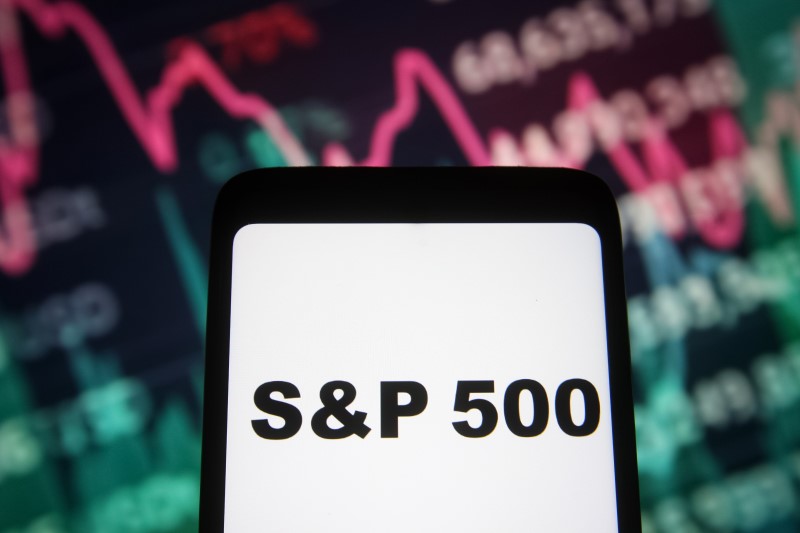 © Reuters. FILE PHOTO: Traders work on the floor of the New York Stock Exchange (NYSE) in New York City, U.S., August 22, 2022. REUTERS/Brendan McDermid
© Reuters. FILE PHOTO: Traders work on the floor of the New York Stock Exchange (NYSE) in New York City, U.S., August 22, 2022. REUTERS/Brendan McDermid By Chuck Mikolajczak
NEW YORK (Reuters) – U.S. stocks ended the month with their fourth straight daily decline on Wednesday, cementing the weakest August performance in seven years as worries about aggressive interest rate hikes from the Federal Reserve persist.
Adding to pressure were declines in the technology sector, and more specifically chipmakers, after soft forecasts from Seagate and HP Inc (NYSE:).
The three main indexes suffered their biggest monthly percentage declines in August since 2015. After hitting a four-month high in mid-August, the has stumbled in recent weeks, dropping more than 8% through Wednesday’s close and falling through several closely watched technical support levels.
Selling pressure accelerated after Fed Chair Jerome Powell’s hawkish remarks on Friday about keeping monetary policy tight “for some time” dashed hopes of more modest interest rate hikes, with the benchmark index down more than 5% over the past four trading sessions.
“All (Powell) cares about is getting inflation down and raising rates to do that, and in terms of how aggressive to be that is all to be determined from the data,” said Tim Ghriskey, senior portfolio strategist at Ingalls & Snyder in New York, New York.
“Right now we are in this flip back-and-forth market, a lot of volatility, concerns the rally we did have was just a bear market rally, probably some concern we will go back down to new lows.”
Cleveland Federal Reserve Bank President Loretta Mester said on Wednesday the central bank will need to boost interest rates somewhat above 4% by early next year and hold them there in order to bring inflation back down to the Fed’s goal, and that the risks of recession over the next year or two have moved up.
The fell 280.44 points, or 0.88%, to 31,510.43; the S&P 500 lost 31.16 points, or 0.78%, to 3,955; and the dropped 66.93 points, or 0.56%, to 11,816.20.
For the month, the Dow fell 4.06%, the S&P 500 lost 4.24% and the Nasdaq declined 4.64%.
Adding to investor nervousness, stocks are also heading into a historically weak period for the market in September.
“September is usually the worst month of the year; it and February are the only ones to post average declines, but September is the only month of the year to fall more than it rises so it could end up being sort of a self-fulfilling prophecy,” said Sam Stovall, chief investment strategist at CFRA in New York.
Data earlier in the day showed ADP private payrolls increased by 132,000 jobs in August, falling short of economists’ forecast of job growth of 288,000, according to a Reuters poll. However, the report was suspended for June and July as the methodology was overhauled following a poor track record of being in sync with the government’s payrolls report.
The jobs data from the Labor Department is due on Friday and is expected to show nonfarm payrolls rose by 300,000 last month after recording a 528,000 increase in July. Another strong report is likely to further cement expectations the Fed will continue with outsized rate hikes after three straight increases of 75 basis points.
The Philadelphia SE semiconductor index lost 1.15% after Seagate, down 3.54%, slashed its first-quarter earnings expectations, citing macroeconomic concerns that are forcing cloud companies and PC makers to cut inventory levels.
In addition, HP Inc fell 7.68% after it forecast downbeat quarterly and full-year profit on slowing PC sales.
Snap Inc (NYSE:) rose 8.69% after saying it will cut 20% of staff, restructure its advertising sales unit and shut down some projects to focus on improving sales and number of Snapchat users.
Chewy (NYSE:) Inc slid 8.18% after the online pet supplies retailer cut its full-year 2022 sales outlook.
Bed Bath & Beyond Inc (NASDAQ:) plunged 21.30% after saying it would close 150 stores, cut jobs and overhaul its merchandising strategy in an attempt to turn around its money-losing business.
Declining issues outnumbered advancing ones on the NYSE by a 2.44-to-1 ratio; on Nasdaq, a 1.32-to-1 ratio favored decliners.
The S&P 500 posted no new 52-week highs and 14 new lows; the Nasdaq Composite recorded 16 new highs and 190 new lows.
Volume on U.S. exchanges was 11.16 billion shares, compared with the 10.52 billion average for the full session over the last 20 trading days.

